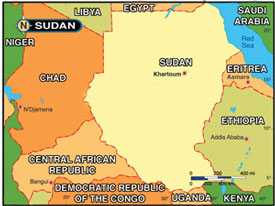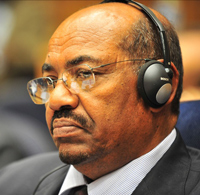 |
President Al-Bashir has a warrant against him from the International Criminal Court, issued in 2009 on charges of alleged war crimes, crimes against humanity and genocide for alleged atrocities in the Western region of Darfur. He has categorically denied the charges, saying the ICC is a tool of neo-colonialism. Some are saying the ICC charges were a bargaining chip, used as leverage by Western nations to marginalize President Al-Bashir and to weaken his opposition to secession by the South.
 President Al-Bashir Photo: MGN Online |
 |
On June 29, the Associated Press reported officials in South Sudan want the U.S. to remove economic sanctions against the North in place since 1997, when then-President Bill Clinton said Sudan supported terrorists such as Osama Bin Laden.
AP revealed the vice president of South Sudan spent three weeks in the U.S. recently in discussions with the Obama administration and ambassadors representing the United Nations Security Council, attempting to get them to realize U.S. sanctions against the Northern regime in Khartoum serve no real purpose today. Since the peace agreement, North and South have shared oil revenues equally, with the lion's-share of the 500,000 barrels a day coming from the South, according to the European Coalition on Oil in Sudan, a group of organizations who say they want to ensure equitable distribution of Sudan's oil wealth.
But, according to the finance minister in Khartoum, the result of the South's secession will be a 36.5 percent drop in revenue. A recent press briefing by a senior U.S. State Department official alluded to the need for agreement between North and South. “They are so intertwined economically that they can hurt each other and hurt themselves very badly, whether it's oil, new currencies, trade or border issues,” said the State Dept.
The official then poured salt on the wound, saying the only path for Khartoum was to find peace in Darfur to get back into the good graces of the international community because the North has “major economical adjustments to make.”
Observers say Washington has opposed Northern Sudan receiving support from the World Bank and the International Monetary Fund as a state sponsor of terrorism. News sources in Washington say the administration is preparing to remove Sudan from its blacklist of nation's sponsoring terrorism, but that is contingent on the Al-Bashir government pulling of its army from the contested border region Abyei.
On June 20, the North and South signed an interim agreement in Addis Ababa, Ethiopia, where the African Union is headquartered, to demilitarize Abyei.
The UN Security Council June 27 passed a unanimous resolution that establishes a 4,200 Ethiopian peacekeeping force known as UNISFA (United Nations Interim Force for Abyei). The peacekeeping force would monitor redeployment of the Sudan Armed Forces and the southern Sudan People's Liberation Army from the Abyei region, roughly the size of Connecticut.
The resolution charges the interim force with facilitating delivery of humanitarian aid and the free movement of relief workers. UNISFA troops would also provide security for the region's oil infrastructure.
Susan Rice, U.S. ambassador to the United Nations, said her government “welcomed the agreement,” but said nothing about lifting sanctions against Khartoum.

No comments:
Post a Comment